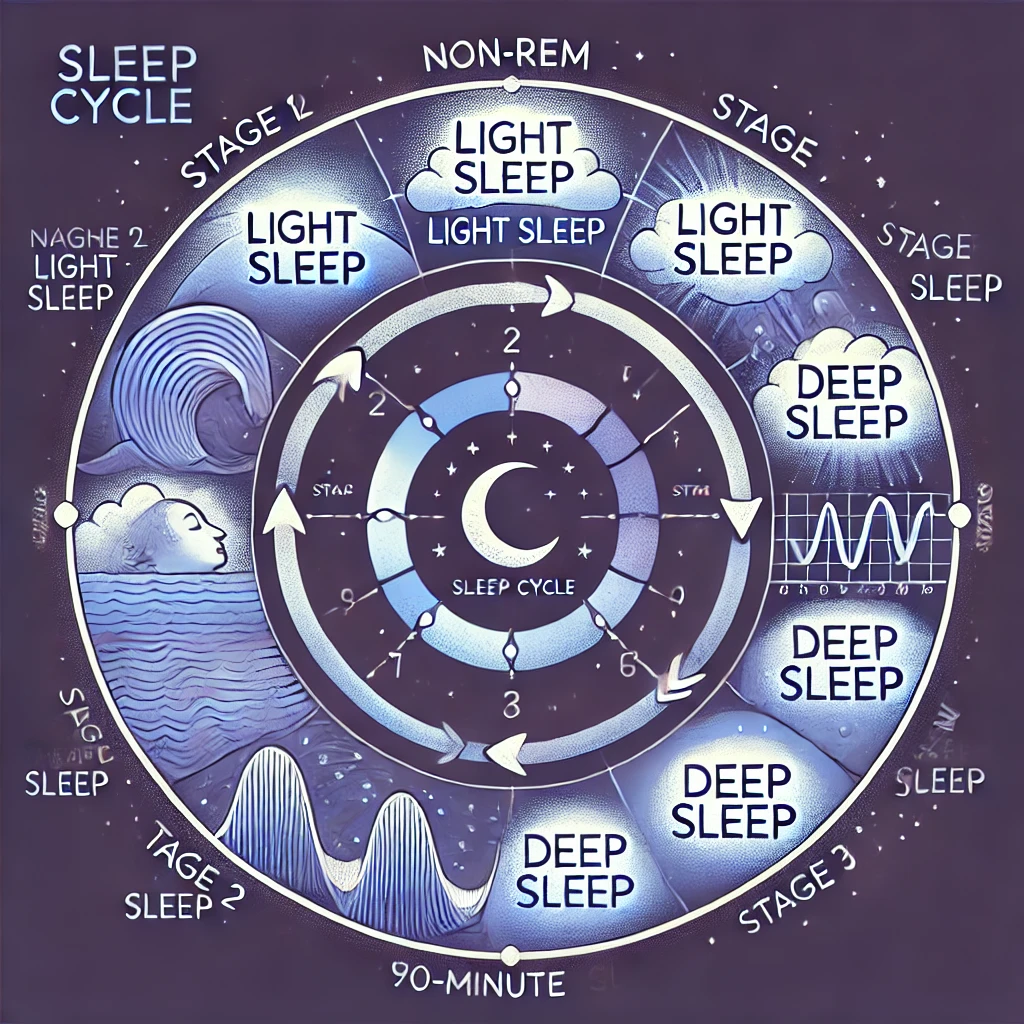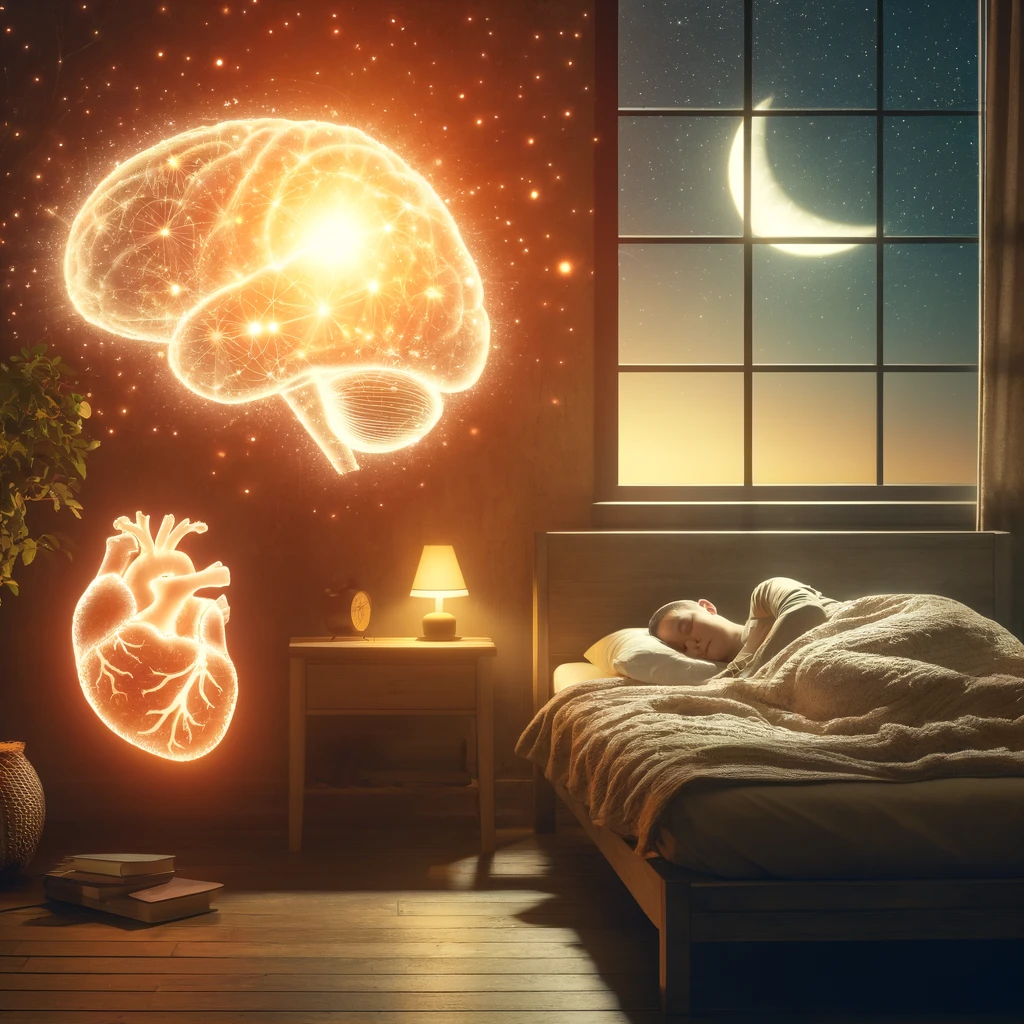“The Impact of Sleep on Mental and Physical Health: Why Quality Rest is Essential”
Introduction
Modern life moves so quickly that there are moments when you hardly have time to pause and relax. It can make consistently getting a decent night’s sleep feel unattainable.
However, sleep is just as vital to health as food and exercise. Getting enough sleep enhances your happiness, health, and cognitive function.
Sleep is physically essential for cardiovascular health since it lowers the risk of heart disease, stroke, and hypertension. By balancing hormones, it also controls appetite and metabolism, preventing weight gain. Additionally, sleep helps the immune system by generating proteins called cytokines, which improve the body’s defenses against inflammation and infections. (NIH News in Health)
Making sleep a priority is a proactive way to enhance general health. People can improve their physical resilience, emotional stability, and cognitive function by implementing appropriate sleep habits, which will ultimately lead to a higher quality of life.
This blog’s goal is to draw attention to how important sleep is for preserving both physical and mental well-being. This blog seeks to inform readers about the importance of getting enough sleep by examining the science underlying sleep, its effects on wellbeing, and the negative effects of sleep deprivation. It also offers doable methods for enhancing sleep patterns, enabling people to take concrete measures for improved health and a more balanced way of living.
How much sleep a person needs?
As you age, your sleep requirements vary. Experts advise teens should receive eight to ten hours per night, while school-age youngsters should get at least nine. The majority of adults require seven hours or more of sleep every night.
There are a lot of misconceptions around sleep. One is that as people age, they require less sleep. This is untrue. The amount is still the same for older folks. But as you age, the quality of your sleep may deteriorate. Additionally, older persons are more likely to take sleep-impairing drugs.
Sleep Science
The circadian rhythm, which is the body’s internal clock, controls the various stages of sleep.Sleep is not consistent. Rather, your overall sleep is comprised of multiple cycles of the sleep cycle, which consists of four distinct stages, throughout the night. A person experiences four to six sleep cycles in a normal night.
Sleep Stages
Rapid eye movement (REM) sleep and non-rapid eye movement (NREM) sleep are the two primary categories of sleep. Every kind includes distinct phases that alternate over the night.

NREM Sleep:
Stage 1: This phase, which lasts for a few minutes, is the change from wakefulness to sleep. Muscles start to relax during this period of light sleep, and respiration, eye movements, and heartbeat all slow down.
Stage 2: A brief interval of light slumber followed by deeper sleep. Muscles relax even more and breathing and heartbeat slow down even more. Body temperature decreases and eye movements cease. Short electrical activity bursts cause the brain’s activity to slow down.
Stage 3: Also referred to as slow-wave sleep or deep sleep, this stage is essential for feeling rejuvenated. Muscles are completely relaxed, and respiration and heart rate drop to their lowest points. During this phase, awakening is challenging.
REM Sleep:
occurs roughly ninety minutes after going to sleep. Behind closed eyelids, the eyes move quickly, and brain activity resembles that of waking. REM sleep is when most dreams occur. In order to stop dreaming, muscles are momentarily paralyzed.
Each of these phases lasts roughly 90 to 110 minutes and repeats cyclically throughout the night. While deep sleep diminishes as the night go on, REM sleep durations increase.
What is Circadian Rhythms
The body’s internal 24-hour clock, known as the circadian rhythm, controls the sleep-wake cycle and affects our feelings of alertness and drowsiness. The brain’s suprachiasmatic nucleus (SCN), which reacts to environmental cues including light and dark, is principally in charge of it.
Light Exposure: The SCN tells the brain to produce less melatonin, a hormone that encourages sleep, when exposed to light, particularly natural sunshine. This results in heightened alertness. On the other hand, darkness causes the SCN to increase melatonin levels, which results in drowsiness.
Daily Fluctuations: Circadian rhythms adapt physiological processes to the outside world by causing changes in body temperature, hormone release, and other physiological activities throughout the day.
Sleep disorders and adverse health effects can result from circadian rhythm disruptions brought on by shift work, time zone changes, or exposure to artificial light at night.
Impact of Sleep on Mental Health
Sleep deprivation causes more than simply fatigue. According to an American Psychological Association study that summarized more than 50 years of research on sleep deprivation and mood, it can impair our emotional functioning, reduce good emotions, and increase our risk for anxiety symptoms.
In our largely sleep-deprived society, quantifying the effects of sleep loss on emotion is critical for promoting psychological health,” said study lead author Cara Palmer, PhD, of Montana State University. “This study represents the most comprehensive synthesis of experimental sleep and emotion research to date, and provides strong evidence that periods of extended wakefulness, shortened sleep duration, and nighttime awakenings adversely influence human emotional functioning.”
The study was published in the journal Psychological Bulletin.
Control of Emotions
Sleep is essential for maintaining emotional stability. Lack of sleep can make it harder to handle stress and everyday demands by increasing anger and emotional instability. Sleep deprivation has been shown to increase anxiety and reduce pleasant moods.
Mental Abilities
For cognitive functions like learning, memory consolidation, and attention, getting enough sleep is essential. Sleep deprivation affects these processes, making it harder to focus, make decisions, and solve problems. Lack of sleep negatively impacts cognitive function, affecting tasks requiring attentiveness and fast thinking, according to studies.
Mental Illnesses Due to Sleep deprivation
Numerous mental health conditions are directly associated with persistent sleep disturbances:
Depression: There is increase in the symptoms of major depressive symptoms in individuals with the lack of proper sleep. Sleep deprivation is also associated with the higher risk of the depression. COLUMBIA PSYCHIATRY
Anxiety: Sleep deprivation makes us less happy, more anxious. Anxiety symptoms are more likely to be heightened in people who are sleep deprived. AMERICAN PSYCHOLOGICAL ASSOCIATION
Bipolar Disorder: Bipolar disorder sufferers who experience sleep deprivation may experience manic episodes, suggesting a close connection between mood stability and sleep habits.
Suicidal Ideation: It is seen that the sleep deprivation can lead to increase in the suicidal thoughts and behavior. By focusing on the sleep issues one can mitigate this risk and improve the overall health outcomes.
What Factors Affect Sleep Quality?
Irregular Sleep Schedules: Sleep can be enhanced by establishing a regular bedtime and wake-up schedule. People going to bed at different times can disturb the circadian rhythm and that disturbs the sleep quality.
Dietary Habits: Consuming excessive amounts of alcohol or coffee might make it difficult to fall or stay asleep
Physical Activity: Physical activity is essential for the healthy life and a good sleep but doing externes exercise near the sleeping time can leads to arousal and disturb the sleep.
Light Exposure: Melatonin, a hormone that controls sleep-wake cycles, can be suppressed by exposure to light, especially blue light from electronics. In a 2016 study, researchers examined how light pollution—which includes light from streetlights, billboards, buildings, automobiles, and more—affects the quality of sleep. They discovered that even a small amount of light, such that from nocturnal lights outside, can interfere with sleep and raise the risk of illness.
Room Temperature: What room temperature is the best for the sleeping is the question often asked. For the best sleeping conditions, experts advise keeping the bedroom temperature between 60- and 68-degrees Fahrenheit.
Snoring: Although some snoring is natural, excessive snoring can have an impact on the sleeper or their partner. One possible cause of this kind of snoring is obstructive sleep apnea (OSA).
Medications: Certain prescription medications, like diuretics, can cause users to wake up in the middle of the night by increasing the desire to use the restroom. Whether prescribed by a physician or purchased over the counter (OTC), sleep aids can have adverse consequences, including daytime sleepiness.
Sleep Disorders: Sleep quality is directly impacted by disorders like restless legs syndrome, sleep apnea, and insomnia. To restore good sleep patterns, it is imperative to seek medical diagnosis and proper treatment for these problems.
Strategies for Improving Sleep Quality
1.Keep the constant sleep schedule: Try to go to sleep and wake up at about the same times every day — even on weekends. This reinforces your body’s sleep cycle (your internal clock), which can make it easier for you to fall asleep and wake up every day.
2. Create a Restful Sleep Environment: You can create a restful sleep environment by reducing the amount of exposure to the blue light before you go to bed, using the earplugs for reducing the ambient noise. Keep your bedroom at or below 65°F (18.3°C) to encourage restful sleep.
3.Don’t drink any liquids before the Bed: Drinking large amounts of water and other liquids leads to excessive urination which can have a negative effect on the sleep quality and daytime energy.
4. Supplements for the good sleep: A number of supplements could aid with your relaxation and sleep, such as: Nitrate of magnesium, zinc, resveratrol, and omega-3
These supplements can be helpful when used in conjunction with other tactics, even though they are not a panacea for sleep problems. To evaluate these supplements’ impact on your sleep and ensure you do not have a bad reaction, try them one at a time.
5.Melatonin supplements: One important sleep hormone that signals to your brain when it is time to unwind and go to sleep is melatonin. Supplementing with melatonin, a very common sleep medication, may help you go to sleep more quickly.
6. Reduce daytime naps: Short power naps have their uses, but prolonged or erratic naps during the day can interfere with your ability to sleep at night. Sleeping during the day might throw off your internal clock, making it difficult for you to fall asleep at night.
7. Exercise regularly: Your general health and quality of sleep can be enhanced by as little as 30 minutes of aerobic exercise each day. Given that exposure to natural light helps regulate your sleep cycle, exercising outside may enhance the advantages even further.
8. Manage stress before going to bed: It can keep you up at night to think about your concerns. To lessen the likelihood that your anxieties will keep you up:
To help you get your problems out of your thoughts,
- write them down before bed
- Write down your to-do list as well if it causes you tension. Set your priorities for tomorrow and the remainder of the week, then make an effort to unwind.
- According to research, a weighted blanket may offer advantages akin to those of deep pressure treatment for treating anxiety and sleeplessness.
- To help you relax, try meditation before bed.
9.Limit large meals before the bed: Limit your large meals before the bed as it can affect your sleep and it may also cause symptoms of acid reflux, which can keep you awake.
10. Rule out sleeping disorders: You might also experience insomnia, which can be caused by factors such as stress and underlying medical conditions. If you’ve always had trouble sleeping, it might be a good idea to consult a healthcare professional.

Very wonderful info can be found on blog.
Your blog is an oasis of information; I keep uncovering gems in every post.
Your writing has a great flow; I enjoyed every phrase of it.